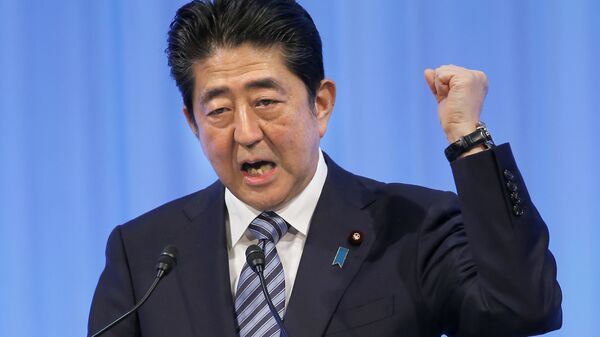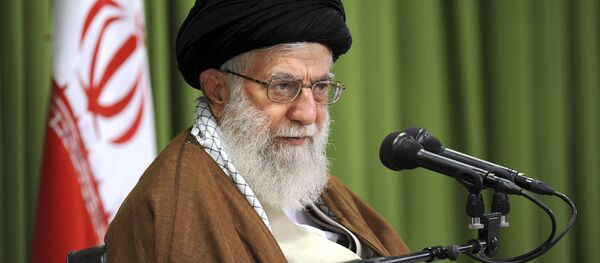Earlier this week Abe held talks with US President Donald Trump and said that Japan "would like to do whatever it can" to resolve the conflict.
Iran's Foreign Ministry spokesman Abbas Mousavi welcomed Japan's offer to act as a mediator with the US, and called next month's visit by Japan's PM "a turning point."
"The United States with its actions has created such mistrust that neither the Parliament, nor the people, nor any department in the Islamic Republic of Iran believes in the need for negotiations. The United States can never be trusted. We have once before held talks. All the participants signed the nuclear deal (JCPOA). The agreement was approved by the UN Security Council, and it was welcomed by the global community. But the Americans considered this agreement unattractive and refused to implement it. Where is the guarantee that if we resume negotiations with the United States and reach an agreement, they will fulfil their obligations? In our country, an atmosphere of distrust of the United States prevails; there are no conditions for negotiations, even if Trump backs down from all his demands".
The lawmaker also added that when the US imposes more sanctions, threatens Iran and then expects that this policy of pressure will get Tehran to hold talks, it is mistaken.
"Iran will not sit at the negotiating table with such a country. Iran does not need a mediator to negotiate; this behaviour by the United States must change".
READ MORE: Japan Sees Limited Impact From US Decision on Iran Sanctions — Report
Regarding the prospects of selling Iranian oil to Japan under sanctions, the politician said: "Iran is trying to get back its oil market. Countries in the market really want to buy our oil. We have avoided sanctions and sold crude before, so we will continue to supply our oil [to customers]", Hossein Naghavi-Hosseini stressed.
With regards to Abe's role as a mediator, Iranian political scientist Dr Ali Rezahah, an expert on US foreign policy and political columnist (KHAMENEI.IR), said that this is a return visit by Japan's prime minister and it will be more of an economic nature:
"The pressure that America is putting on the energy sector of the region is directly related to the energy problems in the US: they are trying to become a major producer, looking for new markets, trying to eliminate competition by force and create dependence on their energy for a number of countries, including Japan. The Japanese are also aware of the prospects of long-term energy dependence: this will lead to great control over their foreign policy by the United States. Japan is one of the consumers of Iranian oil, and they believe that if they manage to discuss this issue (in Iran), then Abe's visit will be considered successful from the economic perspective".
READ MORE: Japan Should Set Up Mechanism for Trade With Iran After Sanctions Waiver —Tokyo
The political scientist also noted that Trump's policy towards Iran should be viewed in light of the upcoming 2020 presidential vote in the US:
"If we analyse these mediation attempts, we tend to adhere to the following theory. The Americans and, in particular, Mr Trump, are preparing for the upcoming presidential elections, he needs to have some achievements on the international arena for his election campaign, so now he is putting maximum pressure on Iran to achieve these goals. It is obvious that potential intermediary states will also be under pressure. Iran has repeatedly stated that while the US is conducting such policies, it is not ready to negotiate. Iran will agree to negotiations only under the condition of a rational and meaningful approach, but not under pressure from the United States. Through such pressure, Trump is trying to dictate his own terms to Iran to score points on the international arena".
"Japan will also have its own conditions under which they can take part in this process. But this issue is much deeper — they can violate US sanctions, and then there will be much more restrictions. Japan will try to help resolve other international problems in order to gain immunity when it comes to energy. At the same time, both they and he Iranians know that the Americans offered to provide Japan with US energy. But the Japanese themselves expressed a desire to have access to several different sources of energy supply, in order to be able to manoeuver, if necessary", the expert concluded.
Another Iranian analyst, Ahmed Rashidi, an expert on geopolitical issues noted that if Abe does come to Iran, then it will be at the request of the United States because Washington is more interested in talks than fighting and uses other countries as mediators like, for example, Qatar and Oman. But the problem, according to Mr Rashidi, is that a situation when there's "no war, no peace" is what the US is interested in.
"The latest media reports suggest that the United States sold about $8 billion worth of weapons to Saudi Arabia. This means that they have declared that the region is in danger and have used this pretext to reach their goal".
But on when it comes to giving up Iranian oil, Japan won't follow the US demand Mr. Rashidi said:
"We know that the Americans are ending sanctions exemptions for Japan. Now the Japanese cannot buy oil from Iran, and if they do, they themselves will be under sanctions. Now Americans have at their disposal most of the world's oil resources, with the exception of Russia and several small countries. If the United States starts developing oil resources in the Middle East, then ultimately this will not benefit Japan, China, and other countries. Therefore, the question arises why does Japan need it. Most likely, Tokyo will buy Iranian oil", the expert concluded.
The views and opinions expressed by the speaker do not necessarily reflect those of Sputnik.



